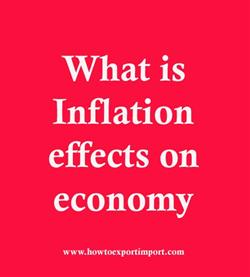Meaning of Inflation effects on economy
The details about Inflation effects on economy are explained here.
Inflation:
Economics, inflation is a sustained increase in the general price level of goods and services in an economy over a period of time. When the price level rises, each unit of currency buys fewer goods and services; consequently, inflation reflects a reduction in the purchasing power per unit of money – a loss of real value in the medium of exchange and unit of account within the economy. A chief measure of price inflation is the inflation rate, the annualized percentage change in a general price index, usually the consumer price index, over time. The opposite of inflation is deflation.
 Inflation affects economies in various positive and negative ways. The negative effects of inflation include an increase in the opportunity cost of holding money, uncertainty over future inflation which may discourage investment and savings, and if inflation were rapid enough, shortages of goods as consumers begin hoarding out of concern that prices will increase in the future. Positive effects include reducing the real burden of public and private debt, keeping nominal interest rates above zero so that central banks can adjust interest rates to stabilize the economy, and reducing unemployment due to nominal wage rigidity.
Inflation affects economies in various positive and negative ways. The negative effects of inflation include an increase in the opportunity cost of holding money, uncertainty over future inflation which may discourage investment and savings, and if inflation were rapid enough, shortages of goods as consumers begin hoarding out of concern that prices will increase in the future. Positive effects include reducing the real burden of public and private debt, keeping nominal interest rates above zero so that central banks can adjust interest rates to stabilize the economy, and reducing unemployment due to nominal wage rigidity.
Economists generally believe that high rates of inflation and hyperinflation are caused by an excessive growth of the money. Views on which factors determine low to moderate rates of inflation are more varied. Low or moderate inflation may be attributed to fluctuations in real demand for goods and services, or changes in available supplies such as during scarcities. However, the consensus view is that a long sustained period of inflation is caused by money supply growing faster than the rate of economic growth.
Today, most economists favor a low and steady rate of inflation. Low (as opposed to zero or negative) inflation reduces the severity of economic recessions by enabling the labor market to adjust more quickly in a downturn, and reduces the risk that a liquidity trap prevents monetary policy from stabilizing the economy. The task of keeping the rate of inflation low and stable is usually given to monetary authorities. Generally, these monetary authorities are the central banks that control monetary policy through the setting of interest rates, through open market operations, and through the setting of banking reserve requirements.
This post describes about Inflation effects on economy. Comment below your thoughts about this post Inflation effects on economy.
Learn Exports Imports Free, Click here
Click here to know GST rate of your goods or service
Import Registration and import Licence procedures in Myanmar
What is Commercial enforcement hold for import cargo in US
What is consolidation of cargo What is LCL cargo less container load cargo
What is Crating in Exports and Imports
What is CT3 form. How to get CT3. Why CT3 required
What is customs bonded area in exports and imports
What is DDP terms in an export Import Business?
What is Dry Port
What is DTA in export import trade?
How to export from Fiji?
How to export from Ethiopia?
How to Import to Ethiopia?
Publication of information in respect of persons in certain cases, Section 159 of CGST Act, 2017
Section 156 Persons deemed to be public servants, CGST Act, 2017
Power to collect statistics, Section 151 of CGST Act, 2017
Goods and services tax compliance rating, Sec 149 of CGST Act, 2017
Section 146 of CGST Act, 2017 Common Portal
Section 145 of CGST Act, 2017 Admissibility of micro films, facsimile copies of documents
Job work procedure, Section 143 of CGST Act, 2017
Section 139 of CGST Act, 2017 Migration of existing taxpayers
Section 135 Presumption of culpable mental state, CGST Act, 2017
Liability of officers and certain other persons, Section 133 of CGST Act, 2017
Sec 132 of CGST Act, 2017 Punishment for certain offences
Section 129 of CGST Act, 2017 Detention, seizure and release of goods and conveyances in transit
Section 124 Fine for failure to furnish statistics, CGST Act, 2017
Sec 122 Penalty for certain offences, CGST Act, 2017
Transition provisions under GST
Term Transition credit under GST
Transfer of credit on sale, merger, amalgamation, lease Means